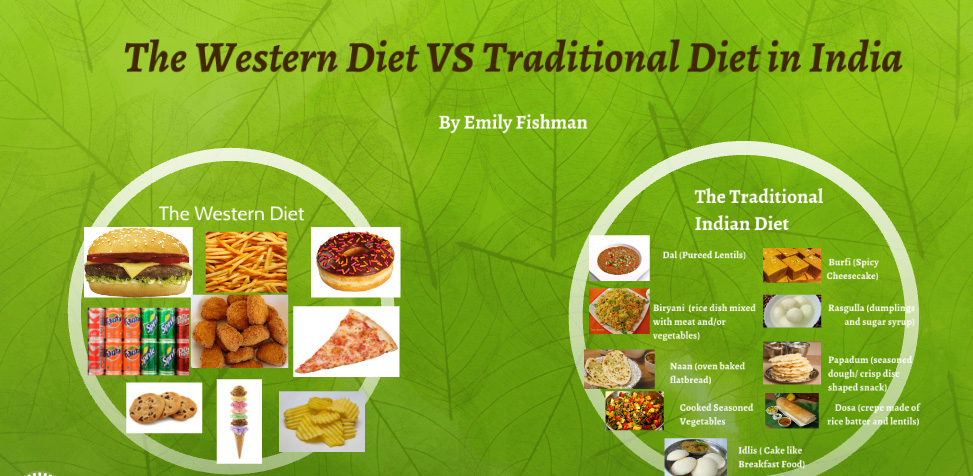| Q: In terms of health outcomes, how does the traditional Indian diet differ from Western diets? | ||
| The traditional Indian diet, rich in plant-based whole foods and spices, has been linked to various health benefits, such as a reduced risk of chronic diseases.
|
||
 |
||
| The Traditional Indian Diet: The traditional Indian diet is a plant-based eating pattern consisting of whole grains, legumes, vegetables, fruits, and spices. It is high in fiber and low in animal products. Spices and herbs are also an important component, associated with various health benefits. Whole Grains: Whole grains such as wheat, millet, and rice are a staple in the Indian diet. These grains are rich in complex carbohydrates, which provide energy and essential nutrients such as fiber, vitamins, and minerals. Studies have shown that the consumption of whole grains is associated with a lower risk of heart disease, diabetes, and certain types of cancer. Legumes: Legumes such as lentils, chickpeas, and kidney beans are also a significant part of the Indian diet. These foods are rich in protein, fiber, and micronutrients such as iron, magnesium, and potassium. Studies have shown that the consumption of legumes is associated with a lower risk of heart disease, diabetes, and certain types of cancer. Vegetables: Vegetables are an essential part of the Indian diet, with a variety of vegetables used in the preparation of traditional Indian dishes. Vegetables are rich in fiber, vitamins, and minerals, and studies have shown that the consumption of vegetables is associated with a lower risk of chronic diseases such as heart disease and cancer. Spices: Spices such as turmeric, cumin, and coriander are an integral part of the Indian diet. These spices are known for their anti-inflammatory and antioxidant properties and have been shown to have numerous health benefits. For example, turmeric has been shown to have anti-inflammatory and anti-cancer properties, while cumin has been shown to improve digestion and reduce inflammation. The Western Diet: The Western diet, on the other hand, is typically high in processed and refined foods, including refined carbohydrates, saturated and trans fats, and added sugars. Animal products such as meat, dairy, and eggs are also a significant part of the Western diet. This type of diet has been linked to a higher risk of chronic diseases such as heart disease, diabetes, and cancer. Refined Carbohydrates: Refined carbohydrates, such as white bread and pasta, are a significant part of the Western diet. These foods are often low in fiber and other essential nutrients and can cause a rapid spike in blood sugar levels, leading to insulin resistance and an increased risk of diabetes. Saturated and Trans Fats: Saturated and trans fats are found in high amounts in the Western diet, particularly in animal products such as meat and dairy. These types of fats have been linked to a higher risk of heart disease and other chronic diseases. Animal Products: Animal products such as meat, dairy, and eggs are also a significant part of the Western diet. These foods are often high in saturated and trans fats and can contribute to a higher risk of chronic diseases such as heart disease and certain types of cancer. Comparing Health Outcomes: Studies have shown that the traditional Indian diet is associated with a lower risk of chronic diseases such as diabetes, heart disease, and certain types of cancer when compared to the Western diet.
|
||
The Mystery takeaway
Indian Takeaway 46 Thornhill Park Rd
Thornhill, Southhampton www.themysterytakeaway.com
|
||
| The Mystery indian Takeaway in SO18, SO19, SO30 and Thornhill park road | ||
 |
 |
|
